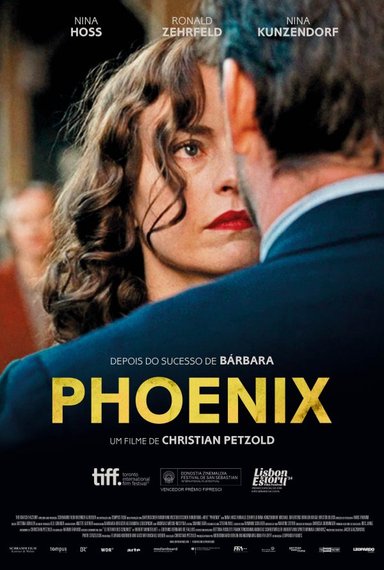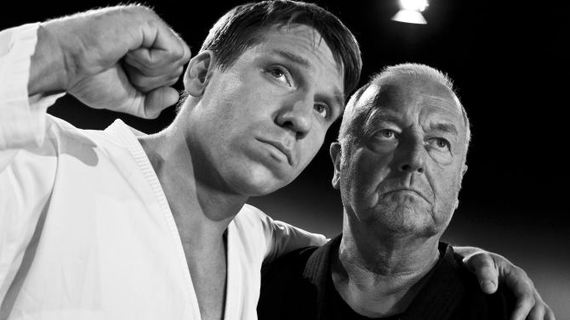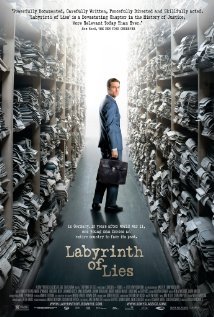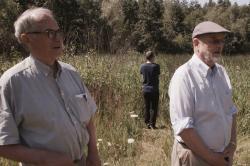
On the Future of Wagnerism, Part 7: The Nazi Legacy, Current Cinema and Questions of Judgment
Is To Know All To Forgive All?
by Lawrence D. Mass
In the recent period I've seen a number of films about the history and legacy of Nazism, most of them German and current, and I read about a new book on two legends of German cinema. The juxtaposition of these events in time seemed coincidental. Or was it?
"Synchronicity" is a concept popularized by Carl Jung to describe concurrent events that may have no apparent or causal relationship, but which may be meaningfully related, even if the meaning is neither intended nor clear. Jung was the pioneering dream-interpretation psychoanalyst and "collective unconscious" spiritualist who broke with Freud, passively collaborated with Nazism, and who spearheaded the founding of Alcoholics Anonymous and the addiction recovery movement. Fascinated and unsettled by the ways Jung has influenced my own life, especially via recovery and my work in addiction medicine, I decided to call the memoir I began writing in 1984 "Synchronicities," a working title that came to me in a dream, beckoning me to tell my story. That story took me ten years to write and is ongoing beyond its publication. Somewhere along the way I decided to change its title to "Confessions of a Jewish Wagnerite." Whatever the title and however ongoing my story, there was something about the contiguity of my being a Jewish Wagnerite in the throes of a burgeoning awareness of my own internalized anti-Semitism, amidst a global resurgence of anti-Semitism and the unfolding of the AIDS epidemic, that seemed synchronicitous, and still does.
The first of the German films, Phoenix, was directed by Christian Petzold, It's a suspenseful film noir about a Jewish woman, Lene, who returns to Berlin in the earliest days following World War II. The streets were still mostly rubble and no one had any money or any goods, including food, or anywhere to go, except a night club called Phoenix, a sleazy Mudd Club-like cabaret (My brother Steve Mass, creator of the original Mudd Club in New York City, the legendary home of many underground and counter-cultural--"New Wave"--artists and musicians in the late 1970's, has been living in Berlin for the last 25 years, running a kind of Mudd Club Ost).
Mutilated in a concentration camp, Lene somehow managed to have reparative cosmetic surgery, which has so altered her appearance that she is not easily recognizable as her former self, not even to her husband, a bouncer at Phoenix, with whom she longs to be reunited. She is still in denial about the extent of her husband's betrayal of her to the Gestapo, just as she is still in denial about the extent of Germany's betrayal of its Jews. Even as she must increasingly face the enormity of those betrayals, she is willing to betray every conceivable standard of her own personal integrity if that will somehow return her former husband and the Germany she called home to their former connubial bliss and shared heimat. Eventually, she sees the truth and viscerally realizes that the husband and homeland she remains so drawn to and in denial about have irreconcilably divorced themselves from her, her people and their fate. What's done cannot be undone. There is and can be no going back.
Notwithstanding some accusations of slickness, Phoenix has been widely acclaimed by critics and audiences. For me personally it had great resonance because it so remarkably captures my own relationship to German musical culture, with which--I started to say with whom--I had such an intense bond. With the same masochism with which Lene sustains her love for and loyalty to her husband and Germany, I sustained my love of Wagner, Strauss, the Berlin and Vienna Philharmonics and for many great artists and conductors of this music--e.g., Schwartzkopf, Furtwangler, von Karajan--in the face of ever-gathering and ever-worsening revelations of their contributions to and collaborations with Nazism, whatever the qualifiers, and in the absence of any expressed regret, remorse or apologies from any of them.
At the time of commencing my Confessions of a Jewish Wagnerite, there were five pictures of Wagner on my living room wall, one of them a drawing by me. Like Lene, and though it took me decades, I finally recognized the reality that kept slapping me ever-harder in the face. Finally, I see it and am resigned to never being able to go back. Loving Wagner is an impossible situation to reconcile for any Jew of any real awareness and integrity, I now feel, certainly for me. And whatever the complexity and degrees of complicity of orchestra players, composers, artists and musicians, and however much I might turn myself into an intellectual and emotional acrobat to minimize and relegate, to forgive and forget, to qualify, there likewise can be no return for me to the old unguarded, unequivocal love and adoration of Heilige Kunst and Hoch Kultur. These no longer feel like safe places. If at one time they seemed places of spiritual heimat, they no longer do. Never say never, but it is not likely that they will ever seem so again.
The second of these films was Reichsorchester, made by German documentary filmmaker Enrique Sanchez Lansch, who was referred to me by my friend of many years, the noted German avant-garde and underground filmmaker Rosa von Praunheim. Lansch is considering doing a film on gay men and opera and wanted to contact me about my memoir.
Incidentally, von Prauheim's latest film, Tough Love, a true story of incest and violence against women, is as trenchant as cinema gets. It's a film that Rainer Werner Fassbinder or Ingmar Bergman would have been proud to call their own. Though it is not about Nazism or its legacy per se and does not specifically mention the war, its scrupulously nonjudgmental portrait of warped mentalities during the early postwar period says more between the lines and by extrapolation about the legacy of Nazism than some documentaries of the Nazizeit that comparably prize objectivity.
Reichsorchester is the story of the Berlin Philharmonic under Hitler, covering the years 1933-1945, with references, as well, to what happened after the war. I saw this documentary when it was first released in 2007. Because of my current work and the referral of Lansch to me by von Praunheim, I re-viewed the film, which meticulously and dispassionately chronicles what happened to the orchestra and its players over those 12 years. It specifies which players became Nazi party members, which Jews were fired or otherwise fled or disappeared, how their instruments were confiscated, how players spied on one another, the privileges they had, and it chronicles the way programs were presented under the auspices of the Reich. As a document of cultural and political history, it is priceless. And its dispassion, remarkable to the extent that there is no sense of narrative voice other than that which is minimally descriptive, seems as if it could have been crucial to eliciting of a lot of information that might not otherwise have been as forthcoming.
That said, something troubled me about this film; in fact, so much so that I found myself writing a rather emotional impression to Lansch. What so disturbed me is what I sensed to be the film's absence of expressed judgment, remorse or regret--on the part of the narrator as well as the players. Certainly, judgment can seem implicit and regret can be inferred, and failure to emote cannot be equated with failure to care. And aren't dispassion and nonjudgmentalism, as in Tough Love, unassailable benchmarks of artistic integrity and quality? Notwithstanding these caveats, for me the absence of feelings haunts Reichsorchester, much as it haunts Hans Jurgen Syberberg's exhaustive documentary interview with Winifred Wagner. While no one wishes that the Winifred Wagner documentary was never made and no one wishes that questions of morality had been so aggressively pressed that she would not have revealed her real feelings and tell the truths she did, one can't help but feel deeply unsettled that the shocking, terrible and shameful truths she did tell remain so unattached to emotion, so unresponded to, and so unjudged--which seems of a piece with the fact that so very few of these figures were ever prosecuted or even censured. Does Reichsorchester adequately engage those challenges, or is it, beyond its acknowledgment of facts and not unlike Winifred Wagner, complicit in evading them?
I don't know Lansch or Syberberg personally, but the latter relinquished any claims to dispassion and objectivity when he came out, many years after completing his 3 big Germany-Wagner-opera films, Our Hitler, Winifred Wagner and Parsifal, with shockingly proto-Nazi and anti-Semitic statements. I have no basis for any preconception of Lansch as such a person, and there were several understated and thereby arguably all the more powerful moments in Reichsorchester that seem tantamount to indictment. The first is a single photo of Jewish protesters at a postwar visit by the Berlin Philharmonic to New York. Placards explicitly decried the orchestra's complicity in Nazism and mass murder. And it was moving when one of the players interviewed recalled that at the first postwar concert in Berlin, Mendelssohn, who had been banned by the Nazis, was on the program. Still, Lansch's dispassion and reticence suggest a distaste for judgment, a reaction often cited by critics as an aggregate and concerning response to the Holocaust by Germans. Like Winifred Wagner, the Berliln Philharmonic players were officially "denazified." As in the case of Winifred, one can't help but ask if the greater chapter on musicians who were "denazified" can really be closed solely on the basis of disclosures of information. Not so unlike Winifred Wagner, Reichsorchester does not make a compelling case for closure.
Closure is something we all seek in German art, an expectation German artists, as well as their audiences, are well aware of. We are always looking for it, hopeful of finding it and eager to proclaim it. But buyer beware. Remember Syberberg's Unser Hitler (Our Hitler-A Film from Germany)? Interpreting that film's ambiguities and taciturnity as implicitly accomplishing the work of judgment, remorse, regret, and atonement, Susan Sontag dubbed it "one of the great works of art of the twentieth century." Of course, that was some years before Syberberg overtly revealed himself to be anti-Semitic and an apologist for Nazism.
Another German film of recent viewing was Labyrinth of Lies, directed by Giulio Riciarelli. The critics were not very kind to this film, which they picked on for not knowing exactly which genre it belonged to, inadvertently revealing their own (the critics') discomfort with the subject matter. What came to mind for me in reading The Guardian's harsh take on Labyrinth was Pauline Kael's New Yorker review of Shoah, which she reviewed as a film. As such, she found it clunky and repetitive, too long, not well made. Meanwhile, nowhere in her review did she indicate any real feeling for the enormity and importance of its revelations, among the greatest and most disturbing in the history of documentary film.
Set in 1958, Labyrinth of Lies reprises the Auschwitz trials that were held in Frankfurt, the only other major trial in Germany, after Nurnberg, of former Nazis. Though 17 concentration camp attendants were tried and prosecuted, the trial remains a distressingly singular episode in a country that retained its collective amnesia but little collective conscience about its pervasive, enthusiastic collaborations with Nazism and wartime atrocities. The film imparts valuable and excruciating history. More importantly, however, it manages to convey that sense of regret and remorse, of genuinely endeavoring to truly, emotionally and viscerally come to grips with what happened, that are notably missing from cultural documentary histories of the Nazi period such as Winifred Wagner and Reichsorchester.
At the conclusion of Winifred Wagner and Reichsorchester, I felt a deep sense of unjudged and unprosecuted injustice. By contrast, at the end of both Phoenix and Labyrinth of Lies, I felt a genuine sense of catharsis.
Reichsorchester was made in 2007, when the challenge to document what happened still seemed urgent. Acknowledgement of the truth, of the specifics and statistics of what happened and failed to happen before, during and in the aftermath of the Holocaust, remains a paramount objective that is impressively engaged by Reichsorchester. Yet today's challenge, as evidenced by Phoenix and Labyrinth of Lies--and even as a younger generation understandably claims distance from the Holocaust--seems more about processing that information, about genuinely experiencing and articulating those feelings of judgment, remorse and regret, and thereby credibly contributing to the vast, unfinished business of atonement, even as the opportunities for those directly involved to do so become increasingly lost. The younger generation, which can legitimately disclaim responsibility for the Holocaust, is beginning to articulate and affirm a level of spiritual reparation that those who perpetrated this history have overwhelmingly failed to do, and have still all too rarely been directly confronted about doing.
Resistance to judgment versus its articulation is the subject of a recent British film,What Our Fathers Did: A Nazi Legacy, a documentary by David Evans that I have not yet seen. The film chronicles the friendships of two sons of high-ranking Nazi officers. Though both are condemning of the Holocaust, one is deeply regretful, remorseful and resoundingly critical of his father for complicity in mass-murder and genocide while the other remains in denial about the man who otherwise seemed to be such a good father.
In Dietrich & Riefenstahl: Hollywood, Berlin and a Century in Two Lives, Karin Wieland compares two legendary German stars whose lives intersected prophetically before diverging mightily, Dietrich the outspokenly anti-Nazi actress and chanteuse, Riefenstahl a key figure in the success and legacy of Nazism who has now spent the bulk of her life being judged for her "apolitical" commitment to her art. Beyond fascinating and telling details, Wieland's conclusions and judgments are hardly surprising. Still, there is abiding value in retelling these stories. Just as there is still resonance in recalling the character played by Dietrich in the film Judgment at Nuremberg, in which she is the iconic image of handsome, patrician, German respectability. As the wife of a convicted Nazi general who is in denial about what she knew, she is, as Claudia Roth Pierpont observed in the New Yorker, "the aggrieved persona of German innocence" who, in response to the guilty verdict of her husband, has no response.
"Who am I to judge?" asked Pope Francis in response to questions about homosexuality. "Judge not lest Ye be judged," Jesus said. "JUDGE NOT!" reads a large poster at a meeting of AA (Alcoholics Anonymous). In Christianity, other religions, philosophies and movements, and in 12-step recovery, suspending judgment and having compassion, mercy, and forgiveness are supreme values. For Plato, justice. together with temperance, courage, and wisdom, was one of the four cardinal virtues. In our times there have been some peak demonstrations of forgiveness, such as the nonviolent civil rights movements led by Mohandas Gandhi, Dr. Martin Luther King Jr and Nelson Mandela, and the Tutsi people's reconciliation of the Hutu genocide against them. But however miraculous compassion, mercy and forgiveness can be, they are not meant to supplant basic precepts of law, order and justice. The priest who gives succor to a convicted criminal does not expect that criminal to be spared his sentence. Courts of law are not expected to absolve alcoholics convicted of major crimes while intoxicated. Nor did the nonviolence and forgiveness of Gandhi, King, Mandela and the Tutsi absolve their former enemies of accountability. Like Labyrinth of Lies, Judgment at Nuremberg reminds us that even when individuals are revealed to be human and their circumstances may appear to be extenuating, and even where compassion, mercy, forgiveness and reconciliation would seem to be surpassingly admirable, desirable and inevitable, the abiding challenge--with the legacy of Nazism, as with other major violations of society, morality and law--is not to evade but to articulate judgment and call for accountability, even when it might be tempting, and coincidentally expedient, to devalue such expectations as eye-for-an-eye and lacking in qualities of mercy.





